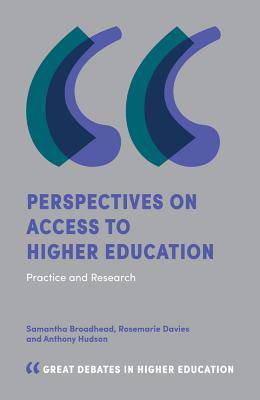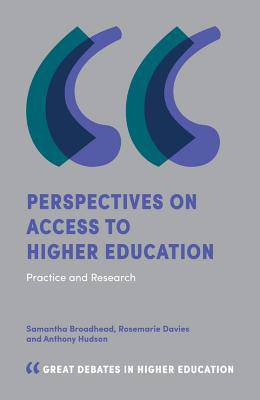
Bedankt voor het vertrouwen het afgelopen jaar! Om jou te bedanken bieden we GRATIS verzending (in België) aan op alles gedurende de hele maand januari.
- Afhalen na 1 uur in een winkel met voorraad
- In januari gratis thuislevering in België
- Ruim aanbod met 7 miljoen producten
Bedankt voor het vertrouwen het afgelopen jaar! Om jou te bedanken bieden we GRATIS verzending (in België) aan op alles gedurende de hele maand januari.
- Afhalen na 1 uur in een winkel met voorraad
- In januari gratis thuislevering in België
- Ruim aanbod met 7 miljoen producten
Zoeken
Perspectives on Access to Higher Education
Practice and Research
Sam Broadhead, Rosemarie Davies, Anthony Hudson
€ 103,95
+ 207 punten
Omschrijving
Access education has been through many changes since its beginnings in the late 1960s. Recent shifts in the academic landscape including standardization, grading, and new tensions in higher education raise difficult questions for educators regarding the future of access education. This book critically examines various aspects of Access education from a historical perspective. It proposes that there are particular 'Access' values that are shared by practitioners that can be at odds with the needs of higher education. Wider questions concerning funding and accountability underpinned by neoliberalism have also had an impact on Access education. The authors, practitioners and researchers of Access education, gather their insights in this timely book, grounded in authentic experience. They explore the ways in which policies and procedures have been developed in light of these tensions. By drawing particular attention to the voices of Access practitioners and highlighting the current constraints around curriculum design this book will prove invaluable for leaders, administrators, researchers and practitioners in further and higher education.
Specificaties
Betrokkenen
- Auteur(s):
- Uitgeverij:
Inhoud
- Aantal bladzijden:
- 184
- Taal:
- Engels
- Reeks:
Eigenschappen
- Productcode (EAN):
- 9781787569942
- Verschijningsdatum:
- 15/05/2019
- Uitvoering:
- Paperback
- Formaat:
- Trade paperback (VS)
- Afmetingen:
- 127 mm x 196 mm
- Gewicht:
- 181 g

Alleen bij Standaard Boekhandel
+ 207 punten op je klantenkaart van Standaard Boekhandel
Beoordelingen
We publiceren alleen reviews die voldoen aan de voorwaarden voor reviews. Bekijk onze voorwaarden voor reviews.









